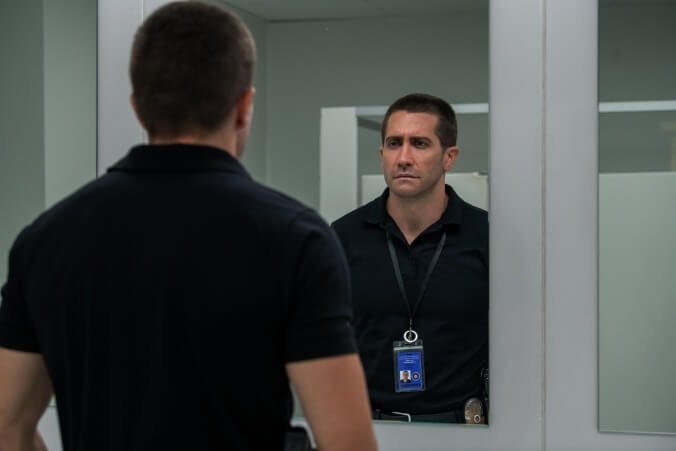Somewhere near the nexus of vanity and ambition lies the allure of the one-man show. What actor can resist the siren call of this challenge, the opportunity to detach the tether of support and become a lone pillar of performance? In the single-location, real-time suspense contraption The Guilty, it’s Jake Gyllenhaal who steps, at last, into the spotlight alone. He’s been cast as a disgraced cop chained to a desk, a phone, and a life-or-death crisis unfolding somewhere in the city beyond his view. A couple other actors pass briefly through his periphery, tossing off a line or two, and a few more serve as offscreen scene partners—we hear their voices on the other end of the line. But for most of its brisk 90 minutes, The Guilty is just Gyllenhaal, in tight close-up, constructing a movie out of sweat and tears alone: a glorified radio play of a thriller whose thrills are generated almost entirely through his reactions.
Gyllenhaal’s character, Joe Baylor, is an LAPD officer relocated to the professional purgatory of a drab, sparsely manned emergency call center while awaiting judgement for something he did in the field. (This something won’t be revealed until the climax, but if you were paying attention in 2020—or, you know, any time throughout the history of policing—you can probably ballpark its nature.) Early into the movie, which leaves the office setting only through a very brief cutaway and bookending establishing shots of the city, Joe’s boredom and scarcely disguised hostility towards nearly everyone dialing him up is disrupted by a true emergency: a distraught woman (voiced by Riley Keough), calling from a car and not speaking freely, who he quickly intuits has been kidnapped by her estranged husband (Peter Sarsgaard). From here, Joe leaps into action without leaping off his post—making frantic phone calls to other departments, trying to pinpoint the woman’s changing whereabouts, justifying shady means through the apparent virtue of their ends.
If all of this sounds familiar, it’s because The Guilty is based on a recent Danish thriller of the same name. To call it a faithful remake would be an understatement: Though relocated to a California ravaged by wildfires (the film was a pandemic production, filmed late last autumn), the story unfolds in an almost identical fashion. Scene for scene, twist for twist, sometimes line for line, it’s the same movie. Beyond the automatic baggage gained by making the protagonist an American cop, the only significant addition is a subplot involving Joe’s own marital troubles and his persistent attempts to get his daughter on the phone. It’s a frankly rather unnecessary bid to provide the character more “dimension,” and to personalize his crusade, as though the original’s general swipe for redemption weren’t motive enough. Otherwise, this had to have been the easiest paycheck hot-shot screenwriter Nic Pizzolatto (True Detective) ever earned; Google Translate probably deserves a co-writer credit.
The Guilty also reunites director Antoine Fuqua with the star of his bombastic boxing drama Southpaw, and returns him to the setting of his most well-regarded movie, Training Day. It is, for the filmmaker, an exercise in minimalism, abstracting the violence and chaos of the city into an unfathomable offscreen force, blazing around the borders of an insulated outpost like the real-life inferno polluting the air. Fuqua, rarely deviating from the original’s refusal to deviate, understands that the tension of this material stems largely from the helplessness Joe feels as a disembodied lifeline, limited in his capacity to intervene by the imprecise technology at his disposal and his (in)ability to control the efforts of colleagues with a wider jurisdiction. There is, perhaps, a karmic irony in his crucible—a man who’s abused his power suddenly feeling very powerless—and a philosophical stance in the literal limits of his perspective. The Guilty becomes, at some point, a drama about false assumptions; the film doesn’t need to directly broach the topic of race for an implied critique of law enforcement to emerge from the smoke.
Most of that, of course, is right there in the original, free to watch now on Hulu and a tick better than the American film it’s inspired, by virtue of getting there first and without minor but superfluous concessions to an audience’s presumed desire to better sympathize with its isolated hero. If there’s a good reason for a viewer to return to this claustrophobic scenario, in full knowledge of both its revelations and the fact that they’re unaltered, it lies of course with Gyllenhaal, giving it his volcanic all in a film which keeps him at the center of nearly every frame. He screams, he swears, he sobs, he sweats bullets, he even brings a little of that amusing signature testiness that’s punched up stock characters—like the put-upon detective of Prisoners—on his resume. One-man shows have their rewards for the audience, too, at least when the actor being showcased puts everything on the table like Gyllenhaal does here.

